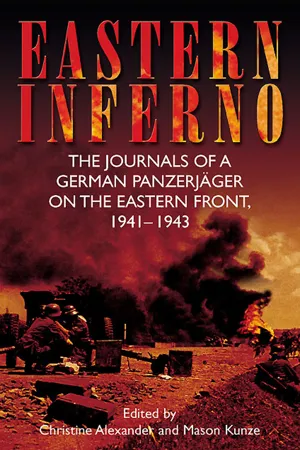
eBook - ePub
Eastern Inferno
The Journals of a German Panzerjäger on the Eastern Front, 1941–43
- 241 pages
- English
- ePUB (mobile friendly)
- Available on iOS & Android
eBook - ePub
Eastern Inferno
The Journals of a German Panzerjäger on the Eastern Front, 1941–43
About this book
"Remarkable personal journals . . revealing the combat experience of the German-Russian War as seldom seen before . . . a harrowing yet poignant story" (
Military Times).
Hans Roth was a member of the anti-tank panzerjager battalion, 299th Infantry Division, attached to the Sixth Army, as the invasion of Russia began. As events transpired, he recorded the tension as the Germans deployed on the Soviet frontier in June 1941. Then, a firestorm broke loose as the Wehrmacht tore across the front, forging into the primitive vastness of the East.
During the Kiev encirclement, Roth's unit was under constant attack as the Soviets desperately tried to break through the German ring. At one point, after the enemy had finally been beaten, a friend serving with the SS led him to a site—possibly Babi Yar—where he witnessed civilians being massacred. After suffering through a brutal winter against apparently endless Russian reserves, his division went on the offensive again when the Germans drove toward Stalingrad.
In these journals, attacks and counterattacks are described in you-are-there detail. Roth wrote privately, as if to keep himself sane, knowing his honest accounts of the horrors in the East could never pass Wehrmacht censors. When the Soviet counteroffensive of winter 1942 begins, his unit is stationed alongside the Italian 8th Army, and his observations of its collapse, as opposed to the reaction of the German troops sent to stiffen its front, are of special fascination.
Roth's three journals were discovered many years after his disappearance, tucked away in the home of his brother. After his brother's death, his family discovered them and sent them to Rosel, Roth's wife. In time, Rosel handed down the journals to Erika, Roth's only daughter, who had emigrated to America. Roth was likely working on a fourth journal before he was reported missing in action in July 1944. Although his ultimate fate remains unknown, what he did leave behind, now finally revealed, is an incredible firsthand account of the horrific war the Germans waged in Russia.
Hans Roth was a member of the anti-tank panzerjager battalion, 299th Infantry Division, attached to the Sixth Army, as the invasion of Russia began. As events transpired, he recorded the tension as the Germans deployed on the Soviet frontier in June 1941. Then, a firestorm broke loose as the Wehrmacht tore across the front, forging into the primitive vastness of the East.
During the Kiev encirclement, Roth's unit was under constant attack as the Soviets desperately tried to break through the German ring. At one point, after the enemy had finally been beaten, a friend serving with the SS led him to a site—possibly Babi Yar—where he witnessed civilians being massacred. After suffering through a brutal winter against apparently endless Russian reserves, his division went on the offensive again when the Germans drove toward Stalingrad.
In these journals, attacks and counterattacks are described in you-are-there detail. Roth wrote privately, as if to keep himself sane, knowing his honest accounts of the horrors in the East could never pass Wehrmacht censors. When the Soviet counteroffensive of winter 1942 begins, his unit is stationed alongside the Italian 8th Army, and his observations of its collapse, as opposed to the reaction of the German troops sent to stiffen its front, are of special fascination.
Roth's three journals were discovered many years after his disappearance, tucked away in the home of his brother. After his brother's death, his family discovered them and sent them to Rosel, Roth's wife. In time, Rosel handed down the journals to Erika, Roth's only daughter, who had emigrated to America. Roth was likely working on a fourth journal before he was reported missing in action in July 1944. Although his ultimate fate remains unknown, what he did leave behind, now finally revealed, is an incredible firsthand account of the horrific war the Germans waged in Russia.
Frequently asked questions
Yes, you can cancel anytime from the Subscription tab in your account settings on the Perlego website. Your subscription will stay active until the end of your current billing period. Learn how to cancel your subscription.
No, books cannot be downloaded as external files, such as PDFs, for use outside of Perlego. However, you can download books within the Perlego app for offline reading on mobile or tablet. Learn more here.
Perlego offers two plans: Essential and Complete
- Essential is ideal for learners and professionals who enjoy exploring a wide range of subjects. Access the Essential Library with 800,000+ trusted titles and best-sellers across business, personal growth, and the humanities. Includes unlimited reading time and Standard Read Aloud voice.
- Complete: Perfect for advanced learners and researchers needing full, unrestricted access. Unlock 1.4M+ books across hundreds of subjects, including academic and specialized titles. The Complete Plan also includes advanced features like Premium Read Aloud and Research Assistant.
We are an online textbook subscription service, where you can get access to an entire online library for less than the price of a single book per month. With over 1 million books across 1000+ topics, we’ve got you covered! Learn more here.
Look out for the read-aloud symbol on your next book to see if you can listen to it. The read-aloud tool reads text aloud for you, highlighting the text as it is being read. You can pause it, speed it up and slow it down. Learn more here.
Yes! You can use the Perlego app on both iOS or Android devices to read anytime, anywhere — even offline. Perfect for commutes or when you’re on the go.
Please note we cannot support devices running on iOS 13 and Android 7 or earlier. Learn more about using the app.
Please note we cannot support devices running on iOS 13 and Android 7 or earlier. Learn more about using the app.
Yes, you can access Eastern Inferno by Christine Alexander, Mason Kunze, Christine Alexander,Mason Kunze in PDF and/or ePUB format, as well as other popular books in History & Military Biographies. We have over one million books available in our catalogue for you to explore.
Information
JOURNAL I
OPERATION BARBAROSSA AND THE BATTLE FOR KIEV
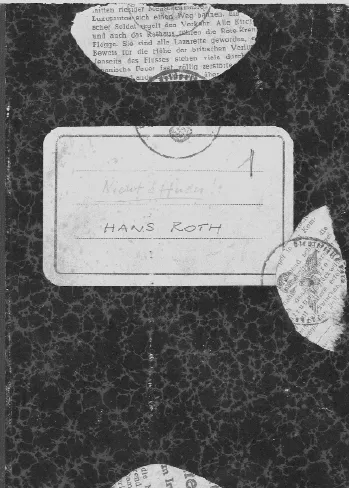
Editors’ Note:
In Hans Roth’s first journal, the 299th Infantry Division, in which he served under General Willi Mosel, is poised at the Bug River in Poland, waiting for the launch of Operation Barbarossa, Germany’s massive surprise attack on the Soviet Union. The division is part of Walter von Reichenau’s Sixth Army, which will comprise the left flank of Field Marshal Gerd von Rundstedt’s Army Group South.
The Germans had arrayed three army groups: North, with Leningrad as its ultimate objective; Center, aimed straight at Moscow; and South, with its first objective Kiev, and then the industrial regions beyond. Army Group North had one panzer group, which was assisted by the proximity of the Baltic Sea in cutting off Soviet forces. Army Group Center had two panzer groups deployed on each wing, which performed an impressive series of encirclement battles at Brest-Litovsk, Minsk, and Smolensk, propelling the Army Group halfway to Moscow within weeks.
The German high command underestimated the challenge for Army Group South, however, as it only had one panzer group, with a huge expanse of territory to cover and no natural obstacles against which to pin enemy concentrations. Further, the Soviet forces in the south, under Marshal Semen Budenny, were the largest of any sector, consisting of over a million men, not counting reserves. All across the front, the Germans were shocked by the numbers of artillery pieces, tanks, and planes the Soviets developed, which far exceeded pre-war estimates, as well as by the ferocity of Soviet resistance. This was especially true in the south.
The result was that while spectacular gains were quickly made by Army Groups North and Center, Army Group South found itself in a difficult, confrontational slog against Budenny’s forces. The First Panzer Group, under von Kleist, could not effect encirclements by itself, even as the vast expanse of the steppe diluted its fighting strength. The initial stage of Operation Barbarossa in the south relied primarily on infantry divisions, which forged gradually across the territory, snowballing numerically superior Soviet forces before them until finally arriving before Kiev, where scenes reminiscent of the trenches of World War I were reprised.
Reichenau’s Sixth Army was the primary instrument of the advance, until in July the high command decided to employ the panzers, along with Seventeenth Army, in a subsidiary encirclement battle against a Soviet salient at Uman. Successfully completed on August 8, with the capture of over 100,000 prisoners, this truncation of Budenny’s forces opened the door to further advances near the lower Dniepr and the Black Sea, including the entranceway to the Crimea.
Meantime, Sixth Army had fought its way through Korosten, Zhitomir and other towns to the outskirts of Kiev, where it found itself in a veritable death-grip with the Soviets’ Southwest Front, which was considerably larger in both men and firepower. While most accounts of the onset of Barbarossa describe spectacular advances by the German panzer divisions, Roth describes the pure hell undergone by the infantry divisions of Sixth Army, as they waited for their high command to devise a solution to their original miscalculation.

In the journals that follow, which were translated from the hand written versions, occasional punctuation and paragraph breaks have been added for clarity. For certain idioms or technical references, explanations have been added [in brackets] where possible. The titles assigned to the journals themselves are the editors’ and were not part of the originals.
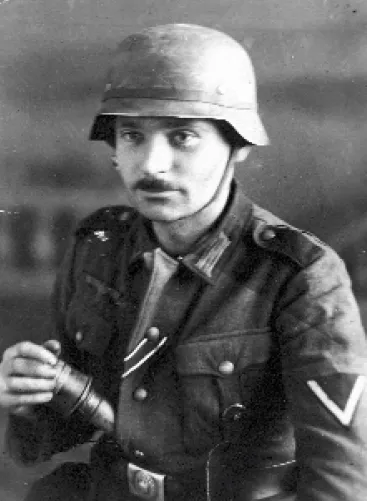
Gefreiter (Private) Hans Roth.
(Photo courtesy of Christine Alexander and Mason Kunze)
(Photo courtesy of Christine Alexander and Mason Kunze)
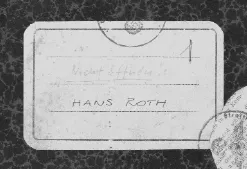
[ON THE JOURNAL’S FIRST PAGE]
Once again we are close to being deployed on another difficult assignment. I am hoping that what follows will become my diary. In it, I will recount the daily events just as they occur, without any embellishment. I am still not permitted to write such things to my wife, but will tell her later.
12 June 1941, Łasków, Poland
12 June, 1941: After an extremely exhausting journey that lasted several days, we arrived in łasków [Poland], about 8 kilometers from the Russian border. Our march went from Kiacz-Wielki via Opatów Lublin-Krasnistaw-Zamosc-Hrubiczo, to our current location. The dust and heat are terrible.
Łasków, which is nothing more than a small hick-town with an unmistakable Ukrainian feel to it, is populated by friendly and clean people. The houses [blockhüssen] are small, single-story constructions with thatched roofs. As wood and straw are the most common construction materials, both the barns and the houses are made from woven willow. The rooms, small but cozy, are always whitewashed or painted light blue with woven straw mats and beautiful local flowers decorating the ovens, walls, and ceilings. Vibrant embroidered pillows and curtains in their blaze of color create a warm but simple atmosphere in the tiny rooms. We pitch our tents in the barn and enjoy some well-deserved peace and quiet.
13 June: Drive to Zamosc in order to take position. The beauty of the town’s market is remarkable. The rich baroque façades of the town hall and center, though unfamiliar to me, are delightful. Truly a wonderful style! Russian churches with their onion domes are found everywhere along the way. The street signs and store fronts are mostly bi-lingual—German and Ukrainian.
14 June: Received orders to drive to the Bug River. With the main intelligence unit [Offz.-Erkundungstrupp] already on location there, I am ordered to map out our observations of the enemy’s positions. On my way there, the construction and support units [bau-und-pionierentrupps] were feverishly working on the roads in disrepair, rushing to build a corduroy road across the swamps and mud.
I arrive in Piaseczno around noon. The forest there has already been taken by the Russians. The Russian flag, with its hammer and sickle, waves within a stone’s throw. It is unimaginable what would happen to our cohorts if the Russians were to get the idea to send out a reconnaissance unit to explore the area. We know all too well that this is possible.
How should we handle this? The Russian bunkers and machine gun positions are just 100 meters away, facing ten soldiers and a few pionieren [engineers]. The river is the border—past it, the abyss. If the Russians do come, we will be unable to retreat, as we are without vehicles. Are we the scapegoats who are supposed to be slaughtered by the Russians [as an excuse] for the German attack? Similar situations took place in Poland. A truly honorable death sentence! Nevertheless, we sleep peacefully. We do not even bother to set out guards. Why should we, only to anticipate the inevitable?
My dear Rosel, if I wrote to you about such events, you surely would not find any peace of mind. How good it is that you do not know about this.
15 June: The situation is becoming more and more serious. Russian scouts were on our side of the river last night, close to our encampment. Gauging from the footprints in the sand, it must have been a group of at least twenty men. What a fine mess we have gotten ourselves into! Should we fire at them?
We are now no longer able to make a move without being noticed. They track our every movement with their scherenfernrohr [scissor telescopes] all day long. We have to sneak like Indians to the riverbank in order to accomplish our task. This is how I will have to map out the enemy’s positions and establish the artillery sectors tomorrow, which should allow us to complete our assignment. I hope that will be the result!
16 June: What luck we have! I was able to finish my task without any disruption from the Reds [die Roten]. I now also know the location of where we, along with our pionieren, are going to traverse the river. Once again we will be part of the first wave! Since the mission is intended to surprise the Russians, the attack will probably commence in a few days. The forest to our rear is filled with intense activity. Heavy artillery has been placed in position. Our panzers have also arrived. Flak cannons were set in place last night.
There is a great deal of activity on the enemy side as well. The Reds have strengthened their positions, and given the noise from the opposing forest, they appear to have rolled their tanks into position. I am extremely tired tonight and it is still unbearably hot.
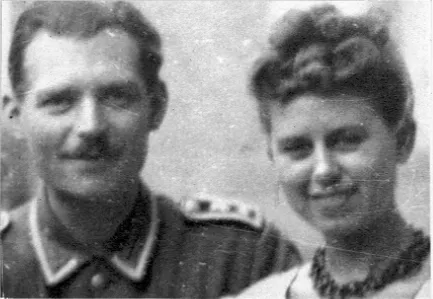
Hans Roth on leave with his wife Rosel.
(Photo courtesy Christine Alexander and Mason Kunze)
(Photo courtesy Christine Alexander and Mason Kunze)
17 June: It is raining, which is a blessing for the local farmers, but bad news for us. Where there were paths yesterday there are muddy creeks today, which reach up to the top of my jackboots.
Our commander [General Willi Moser] arrives at noon. He brings bad news, declaring that we have to stay put for a few more days. The weather clears up in the evening, and a stroll down to the bridgehead on the Bug wonderfully relaxes my nerves, which have suffered greatly under the tension of the past few days.
I now know the day of the attack. It will unfold on June 21, and stretch across an expansive front. What will the following weeks bring? I think of my dear family with longing. As I have asked myself so often in the past, I wonder if my longing actually comes from simply missing the comforts of civilian life. I thought about this on my way down to the fortifications on the Bug: such an idea is not possible. Time and time again I envision Rosel and Butziben [daughter Erika]. How else could the true love that speaks from each line of her letters touch me so deeply? These two people are the most precious things that life could have taken away from me.
My thoughts are with Father and Mother, these two kind beings; the love between is us great. With gratitude I think of all the good things they have done for Rosel and me. God willing, I will get through the coming weeks—for their sake.
18 June: It is now becoming serious. Under the cover of night, the entire division will move into attack formation. Reinforcement troops from the 528th Infantry Regiment arrived today around noon—young guys with fresh faces. For some of them, the sun will shine for only a few more days. Such is the soldier’s fate! I expect the attack to occur across the front on Sunday.
This new day has already brought great joy to me—two lovely letters from my dear Rosel and one sweet letter from Hanau.
19 June: My most recent observations lead me to assume that our section [of the front] should expect great resistance. Will our surprise maneuver really succeed?
Further to the rear, farmers are forced to leave their fields and property. Our troops might also have to advance tomorrow. It is atrocious. The farmers’ wives hurl themselves on the ground, pulling their hair. All this damn crying! There is no way we can help them!
Hurray! The greatest battle of all times will start the day after tomorrow!
20 June: Our cabin is being abandoned. The division has arrived; final preparations for the strike on the Bug fortifications.
21 June: The attack starts tonight at 0300 hours. We are attached to the von Kleist group [1st Panzergruppe commanded by Field Marshal Paul Ludwig Ewald von Kleist]. Our assignment: a rapid putsch in wedge formation, regardless of casualties…
For the moment there is a quiet, wonderful, twilight peacefulness over the countryside. The huts in the village will be on fire in a few hours; the air will be filled with the howling and screeching of shells. The impact of the shelling will tear apart the fields and roads.
How amazing it is that we are once again part of this offensive—fighting under Kleist. Farewell my wife and sweet Erika. Farewell my beloved parents. You will be in my thoughts tomorrow. Do not worry; a soldier’s luck will be with me.
22 June: All of a sudden, at exactly 0315 hours, and apparently out of the blue, an opening salvo emerges from the barrels of hundreds of guns of all calibers. The howling and staccato of Stalin’s arsenal fills the air as if Armageddon had begun. It is impossible to comprehend one’s world in such an inferno.
Our homeland is still innocently asleep while here death is already collecting a rich harvest. We crouch in our holes with pallid but resolved faces while counting the minutes until we storm the Bug fortifications… a reassuring touch of our ID tags, the arming of hand grenades, the securing of our MPi [machinenpistole: submachine gun].
It is now 0330 hours. A whistle sounds; we quickly jump out from undercover and at an insane speed cross the 20 meters to the inflatable boats. In a snatch we are on the other side of the river where rattling machine gun fire awaits us. We have our first casualties.
With the help of a few sturmpionieren we slowly—much too slowly—eat through the barbed wire barriers. Meanwhile, shells fire into the bunkers at Molnikow [Ukraine].
We finally get out of this mess. In a few short steps we are able to advance to the first bunker, arriving in its blind spot. The Reds fire like mad but are unable to reach us. The decisive moment is near. An explosive specialist approaches the bunker from behind and shoves in a short-fused bomb into the bunker’s fire hole. The bunker shook, and black smoke emerged from its openings, signaling its final doom. We move on.
Molnikow is completely in our hands by 1000 hours. The Reds, hunted by our infantry, disperse quickly to Bisknjiczo-Ruski. Because the crossing of the river by our panzers is progressing slowly, we are ordered to cleanse the village of any remaining enemy combatants. The area is combed house by house. Our shelling has caused terrible damage. The Reds, however, have also done their fair share.
Slowly, our nerves grow accustomed to the all too familiar gruesome images. Close to the Reds’ customs house lies a large mound of fallen Russians, most of them torn to shreds from the shelling. Slaughtered civilians lie in the neighboring house. The horridly disfigured bodies of a young woman and her two small children lie among their shattered personal belongings in another small, cleansed house.
I am compelled to think of you Rosel and Erika, when I witness such horrible images. How wonderful it is that we are able to exterminate these murderous beasts. How good it...
Table of contents
- Front Cover
- Title Page
- Copyright Page
- Contents
- Dedication
- Preface
- Foreword
- Award Page
- Journal I OPERATION BARBAROSSA AND THE BATTLE FOR KIEV
- Journal II MARCH TO THE EAST AND THE WINTER OF 1941–42
- Journal III FRONTLINE WARFARE AND THE RETREAT AFTER STALINGRAD
- Final Documents
- Suggested Reading
- Notes